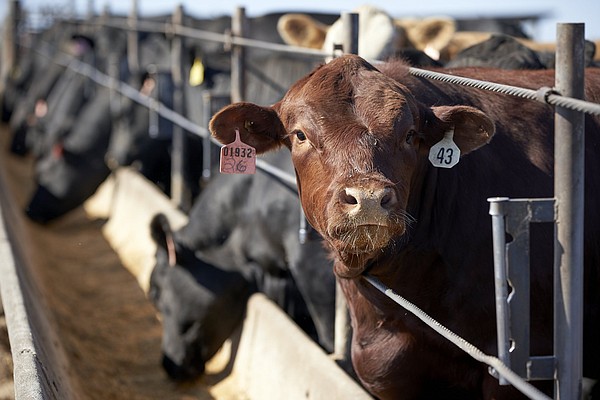
SHEPHERD, Mont. -- Judging from the prices at supermarkets and restaurants, this would appear to be a lucrative moment for cattle ranchers like Steve Charter.
America is consuming more beef than ever, while prices have climbed by one-fifth over the past year -- a primary driver for the growing alarm over inflation.
But somewhere between American dinner plates and his 8,000-acre ranch on the high plains of Montana, Charter's share of the $66 billion beef cattle industry has vanished.
A third-generation cattle rancher, Charter, 69, is accustomed to working seven days a week, 365 days a year -- in winter temperatures descending to minus 40, and in summer swelter reaching 110 degrees.
Charter has long imagined his six grandchildren continuing his way of life. But with no profits in five years, he is pondering the fate that has befallen more than a half-million other American ranchers in recent decades: selling off his herd.
"We are contemplating getting out," Charter said, his voice catching as he choked back tears. "We are not getting our share of the consumer dollars."
Since the 1980s, the four largest meatpackers -- Tyson Foods and Cargill, plus a pair of companies controlled by Brazilian corporate owners, National Beef Packing Co. and JBS -- have used a wave of mergers to increase their share of the market from 36% to 85%, according to the U.S. Department of Agriculture.
Their dominance has allowed them to squeeze out competition and dictate prices, as federal authorities have weakened the enforcement of laws enacted a century ago to tame the excesses of the robber barons, say antitrust experts and advocates for the ranchers.
One landmark piece of legislation, the Packers & Stockyards Act of 1921, was adopted by Congress to "safeguard farmers and ranchers" -- among other market participants -- from "unjustly discriminatory and monopolistic practices."
Today's record high beef prices are most directly reflective of scarce stocks, another manifestation of the supply chain disruption accompanying the pandemic. The initial spread of the coronavirus swept through slaughterhouses, killing scores of workers, sickening thousands and halting production. That caused shortages of beef.
But the shock landed atop decades of takeovers that closed slaughterhouses. The basic laws of economics suggest what happens when the packers cut their capacity to process beef: The supply is reduced, increasing consumer prices. Fewer slaughterhouses limits the demand for live cattle, lowering prices paid to ranchers for their animals -- an advantage for the packers.
"Their goal is to control the market so that they can control the price," said Marion Nestle, a professor of food studies and public health at New York University. "The pandemic exposed the consequences of the consolidation of the meat industry."
The packers -- confronting a push from the Biden administration to revive antitrust enforcement -- maintain the attention on consolidation is misguided.
'NOT MASTERMINDS'
JBS, the largest meatpacker in the United States, declined to discuss the impact of consolidation on the market, instead referring questions to a Washington lobbying organization, the North American Meat Institute.
"Concentration has nothing to do with price," said a spokesperson for the organization, Sarah Little. "The cattle and beef markets are dynamic."
As slaughterhouses work through a glut of live cattle, ranchers have in recent weeks received rising prices for their animals, she said.
Cassandra Fish, a former senior executive at Tyson who now runs a beef industry consultancy, said the shuttering of slaughterhouses by meatpackers in recent decades was prompted by the simple fact that many were losing money.
"The packers are not masterminds," she said. "The packing industry was unprofitable for several years, so they closed plants."
But ranchers complain that the game is rigged.
They generally raise calves, allowing them to roam across grassland until they are big enough to be sold to so-called feed lots that administer grains to bring them to slaughtering weight. The feed lots -- the largest concentrated in Texas, Nebraska, Kansas and Colorado -- then sell their animals to the packers.
Because the feed lots face relentless pressure from the packers for lower prices, they demand cut-rate terms from the ranchers.
A SHRINKING CUT
In past decades, when beef prices rose, so would payments to cattle ranchers, who claimed over half of what consumers paid for meat. But that relationship began to break down in 2015. Last year, cattle ranchers received only 37 cents on every dollar spent on beef, according to federal data.
"You're having consumers exploited on one end of the supply chain, cattle producers exploited on the other," said Bill Bullard, a former rancher who now heads an advocacy group, the Ranchers-Cattlemen Action Legal Fund. "The meatpackers are making all-time record profits."
His organization is a plaintiff in a class-action lawsuit that accuses meatpackers of manipulating prices by sharply reducing their purchases of cattle at so-called sale barns -- open marketplaces where animals are inspected and purchased on the spot, with the prices disclosed publicly.
Instead, the packers now overwhelmingly rely on private contracts with feed lots. Those contracts provide the feed lots with certainty that the packers will buy their animals. In exchange, the feed lots must lock into a price structure that tracks those in public auctions, where buyers are scarce.
According to industry experts, this system allows packers to lock up the overwhelming supply of cattle at prices they impose, under terms hidden from public view. Given the market dominance of the four largest packers in their regions, feed lots lack alternative places to sell their animals once they reach slaughtering weight.
"There's no competition," said Ty Thompson, an auctioneer at the public auction yards in Billings, Mont., who also operates his own feed lots. "We have so much supply and so little capacity, that there's no negotiation whatsoever."
"share" - Google News
December 28, 2021 at 03:12PM
https://ift.tt/3pAcscE
Ranchers: Not getting our share - Arkansas Online
"share" - Google News
https://ift.tt/2VXQsKd
https://ift.tt/3d2Wjnc
Bagikan Berita Ini














0 Response to "Ranchers: Not getting our share - Arkansas Online"
Post a Comment